Nancy AllbrittonKenan Professor of Chemistry and Biomedical Engineering and Chair of the Joint Department of Biomedical Engineering, University of North Carolina and North Carolina State University Nancy L. Allbritton is the Kenan Professor of Chemistry and Biomedical Engineering and Chair of the Joint Department of Biomedical Engineering at the University of North Carolina at Chapel Hill (UNC) and North Carolina State University (NC State). Her research focuses on the development of novel technologies for applications in single-cell analysis, micro-arrays and fluidics, and organ-on-chip and has resulted in over 180 full-length journal publications and patents and led to 15 commercial products. Her research program has been well funded by the National Institutes of Health with $60 million in grant funding since 1994. Four companies have been formed based on her research discoveries: Protein Simple (acquired by Bio-Techne in 2014 for $308M), Intellego (subsequently integrated into International Rectifier), Cell Microsystems (www.cellmicrosystems.com), and Altis Biosystems (www.altisbiosystems.com). Dr. Allbritton is a Fellow of the American Association for the Advancement of Science, the American Institute for Medical & Biological Engineering, and the National Academy of Inventors. She obtained her B.S. in physics from Louisiana State University, M.D. from Johns Hopkins University, and Ph.D. in Medical Physics/Medical Engineering from the Massachusetts Institute of Technology, with a postdoctoral fellowship at Stanford University. |
Martyn BoutelleProfessor of Biomedical Sensors Engineering, Imperial College London Martyn Boutelle is Professor of Biomedical Sensors Engineering in the Department of Bioengineering, Imperial College London, and Associate Provost for Estates Planning for Imperial College. |
Andrew J deMelloProfessor of Biochemical Engineering & Institute Chair, ETH Zürich Andrew is currently Professor of Biochemical Engineering in the Department of Chemistry & Applied Biosciences at ETH Zürich, and until October 2020 was Head of the Institute for Chemical and Bioengineering. Prior to his arrival in Zurich, he was Professor of Chemical Nanosciences and Head of the Nanostructured Materials and Devices Section in the Chemistry Department at Imperial College London. His research interests cover a broad range of activities in the broad areas of microfluidics and nanoscale science. Primary specializations include the development of microfluidic devices for high-throughput biological and chemical analysis, ultra-sensitive optical spectroscopies, microfluidic tools for material synthesis and clinical diagnostic technologies. |
Alberto EscarpaFull Professor of Analytical Chemistry, University of Alcalá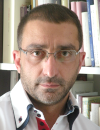 Dr. Alberto Escarpa is Full Professor of Analytical Chemistry at the University of Alcalá since 2017. He has received several awards such the prestigious NATO post-doctoral Scholarship as postdoc researcher at the New Mexico State University (USA) in 2001 or the "Young Investigator Award" by the University of Alcala in 2003. He is the leader and founder of the group “Analytical Miniaturization and Nanotechnology” since 2003. His research activity is focused on microfluidics, biosensing, nanomaterials and micro motors. |
Thomas LaurellProfessor, Department of Biomedical Engineering, Lund University Thomas Laurell received his PhD in electrical engineering in 1995 at Lund University and obtained a position as associate professor in 1998 at Lund University performing research on lab-on-a-chip technology interfaced to mass spectrometry proteomics and disease biomarker research as well acoustic manipulation of cells and particles in microfluidics systems. He holds a position as Professor in Medical and Chemical Microsensors since 2000 with a focus on Lab-On-A-Chip technologies in biomedicine at the Department of Biomedical Engineering, Div. Nanobiotechnology and Lab-on-a-chip (http://bme.lth.se/research-pages/nanobiotechnology-and-lab-on-a-chip/). |
Carl MeinhartProfessor, University of California-Santa Barbara Dr. Meinhart is a professor of Mechanical Engineering at the University of California – Santa Barbara. He completed his PhD and Postdoctoral work at the University of Illinois in June of 1995. At the University of Illinois, his research involved the investigation of turbulent flows. Since coming to UCSB in 1996, his research has focused on developing microfluidic devices and exploring their fundamental transport mechanisms. Dr. Meinhart is a fellow of the American Physical Society. Prof. Meinhart’s group pioneered the concept of free-surface microfluidics. In collaboration with Prof. Martin Moskovits’ group in chemistry at UCSB, and their respective students, they have developed a novel technique for measuring gas-phase chemicals with very high sensitivity. |
Holger SchmidtNarinder Kapany Professor of Electrical Engineering, University of California-Santa Cruz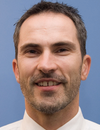 Holger Schmidt received the Ph.D. degree in electrical and computer engineering from the University of California Santa Barbara and served as a Postdoctoral Fellow at M.I.T. He is currently the Narinder Kapany Chair of Optoelectronics and Distinguished Professor of Electrical and Computer Engineering at UC Santa Cruz. He directs the W.M. Keck Center for Nanoscale Optofluidics and has served as the Associate Dean for Research in the Baskin School of Engineering. His research interests cover a broad range in photonics and integrated optics, including optofluidic devices, nanopore sensors, nano-magneto-optics, spintronic devices, and ultrafast optics. He has authored more than 400 publications, several book chapters, and co-edited the CRC Handbook of Optofluidics. He is a Fellow of the National Academy of Inventors, the IEEE and the Optical Society of America. He received an NSF Career Award, a Keck Futures Nanotechnology Award, and the Engineering Achievement Award by the IEEE Photonics Society. |
Oliver SchmidtProfessor & Director, Leibniz-Institut für Festkörper- und Werkstoffforschung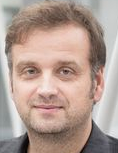 Prof. Dr. Oliver G. Schmidt is a Director at the IFW Dresden, Germany, and holds a full Professorship for Material Systems for Nanoelectronics at the Chemnitz University of Technology,Germany. His interdisciplinary activities bridge across several research fields, ranging from nanophotonics, nanoelectronics and microfluidics to microrobotics and biophysics. He has received several awards: the Otto-Hahn Medal from the Max-Planck-Society in 2000, the Philip-Morris Research Award in 2002 and the Carus-Medal from the German Academy of Natural Scientists Leopoldina in 2005. In 2010, he was awarded the Guinness World Record for the smallest man-made jet engine. More recently, he received the International Dresden Barkhausen Award 2013 for his work on “Materials, Architectures and Integration of Nanomembranes”. He has published more than 650 papers in peer-reviewed journals and has an H-Index of 82. |
Steve SoperFoundation Distinguished Professor, Director, Center of BioModular Multi-Scale System for Precision Medicine, The University of Kansas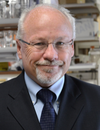 Prof. Soper is currently a Foundation Distinguished Professor in Chemistry and Mechanical Engineering at the University of Kansas, Lawrence. Prof. Soper also holds an appointment at Ulsan National Institute of Science and Technology in Ulsan, South Korea, where he is a World Class University Professor. He is also serving as a Science Advisor for a number of major worldwide companies. Prof. Soper is currently on the Editorial Board for Scientific Reports and Journal of Micro- and Nanosystems. |
Shoji TakeuchiProfessor, Center For International Research on Integrative Biomedical Systems (CIBiS), Institute of Industrial Science, The University of Tokyo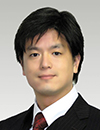 Shoji Takeuchi received the B.E, M.E., and Dr. Eng. degrees in mechanical engineering from the University of Tokyo, Tokyo, Japan, in 1995, 1997, and 2000, respectively. He is currently a Professor in the Center for International Research on Integrative Biomedical Systems (CIBiS), Institute of Industrial Science (IIS), University of Tokyo. Since 2008, he is a director of Collaborative Research Center for Bio/Nano Hybrid Process at IIS. His current research interests include membrane protein chips, bottom-up tissue engineering and biohybrid MEMS. He received several awards including Young Scientists' Prize, the Commendation for Science and Technology by the Minister of Education, Culture, Sports, Science and Technology in 2008, the JSPS prize from the Japan Society for the Promotion of Science in 2010. |
Elisabeth VerpoorteChair of Analytical Chemistry and Pharmaceutical Analysis, University of Groningen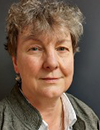 E.M.J. (Sabeth) Verpoorte has more than 30 years of research experience in the microfluidics or lab-on-a-chip field. Her introduction to this technology came in 1990, after her PhD with D. Jed Harrison at the University of Alberta, when she started as a postdoctoral researcher to the pioneering µTAS group headed by Professor Andreas Manz at Ciba Ltd., Basel, Switzerland. In 2003, Sabeth made a strategic switch to assume a Chair in the Groningen Research Institute of Pharmacy, making a foray into a new research environment dominated by cells, tissue and drug development. Projects have involved the development of organ-on-a-chip systems to study drug metabolism (liver chip, gut chip), diagnose endothelial dysfunction and monitor liver tissue function. Efforts have also concentrated on continuous-flow particle separation strategies, paper microfluidics, as well as miniaturized analytical instrumentation (paper spray ionization, multidimensional chromatography). The acquisition of interdisciplinary projects involving scientists from the life sciences, chemistry, and physics disciplines continues to be a driving force in her research. |




